
Inspiring Germany
11 folk festivals: Roller coasters, brass band music and lots of fun!
Folk festivals have a long history in Germany – some of them have been around for 500 or even 1,000 years. They were often created for traditional occasions, but their appeal is just as strong today.
Fun for the whole family: a folk festival is as exciting for the little ones as much as the grown-ups. Hardly anyone can resist the fairground's charm and special atmosphere. Colourful lights, lots of music, the delicious smell of roasted almonds, people smiling, beautiful traditions and rituals, community, joy: in addition to the traditions, there are always new attractions and a colourful mix of games and fairground rides, confectionery, tasty regional specialities and even musical events at the big fairs in Germany. The largest festivals of this kind in Germany take place from April to November. With some smart planning, you can visit one after the other: let us introduce them to you here in chronological order!
Hamburg DOM:
Winter, Spring and Summer DOM
Held three times a year, this festival takes place on the Heiligengeistfeld: in spring, summer and winter you can visit the Hamburg DOM. More than 200 fairground entertainers line up along the 1.6 kilometer-long DOM Mile and greet visitors with a colourful combination of rides, amusement stands, snack bars, bakeries and sweet shops. This folk festival was founded in the 11th century and has been attracting people of all ages ever since. Children should get excited for the family roller coaster, the Hanse Train and rides in mini helicopters, flying cars and UFOs. Whether mulled wine and grog in winter, or cocktails and beer in summer: DOM bars are inviting you to a cosy get-together.
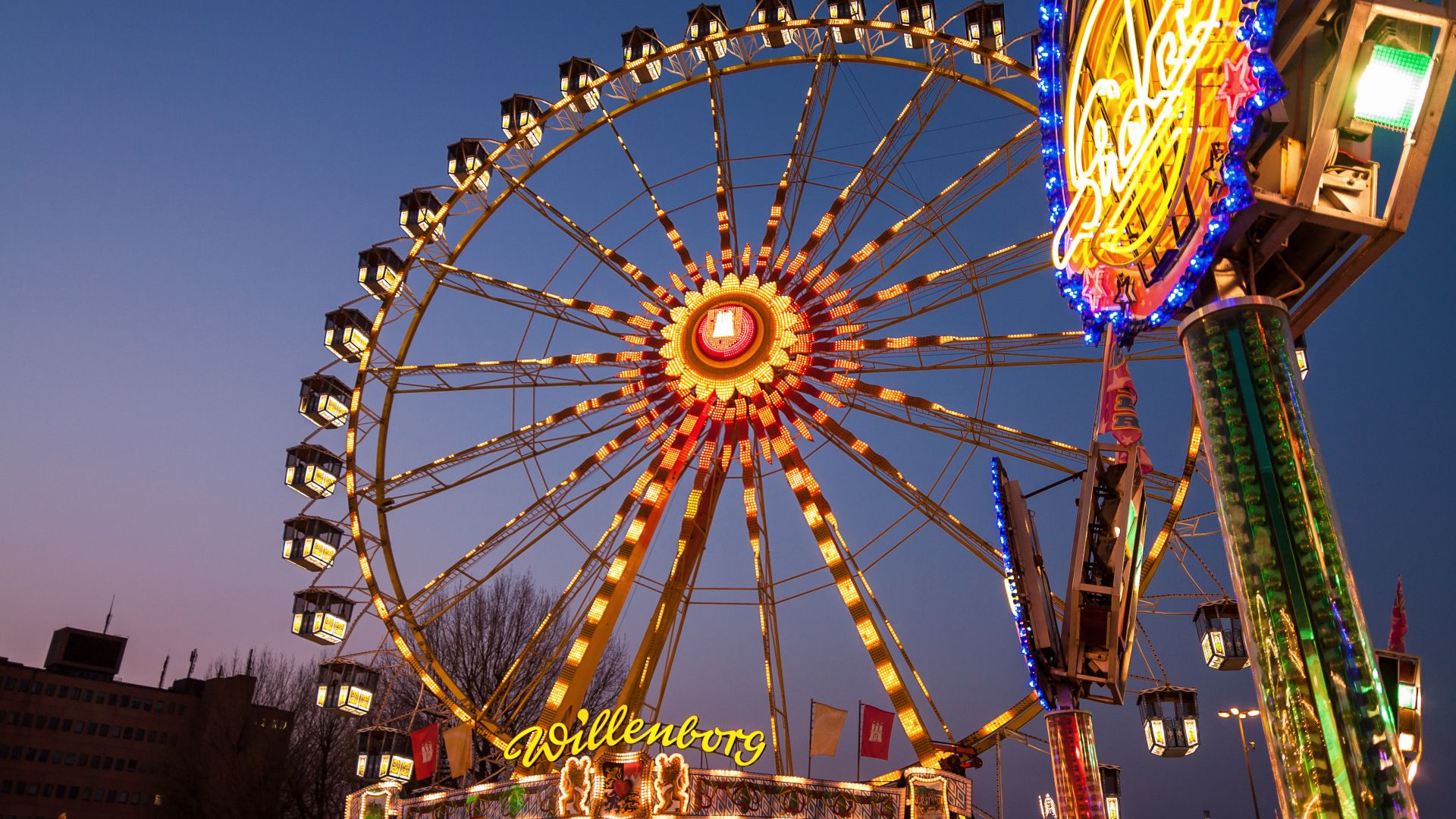 Hamburg: Ferris wheel on the Hamburg DOM
©Adobe Stock (deejaymd)
Hamburg: Ferris wheel on the Hamburg DOM
©Adobe Stock (deejaymd)
Nuremberg Folk Festival:
Spring and Autumn Fairs
You can enjoy the Franconian metropolis' big folk festival – twice! Plenty of exciting rides, including a virtual reality roller coaster, the Wilde Maus XXL, as well as fun houses, amusement stalls and other attractions from all over Germany are here for you to enjoy in the so-called Dürer city. When you've worked up an appetite, you can choose from five marquees, more than 40 food and drink outlets, and over 20 ice cream and confectionary stands. There is also a beer village in Nuremberg and lots of fun for the whole family. The Nuremberg Folk Festival is the perfect stop on a trip onwards to Franconian Switzerland.
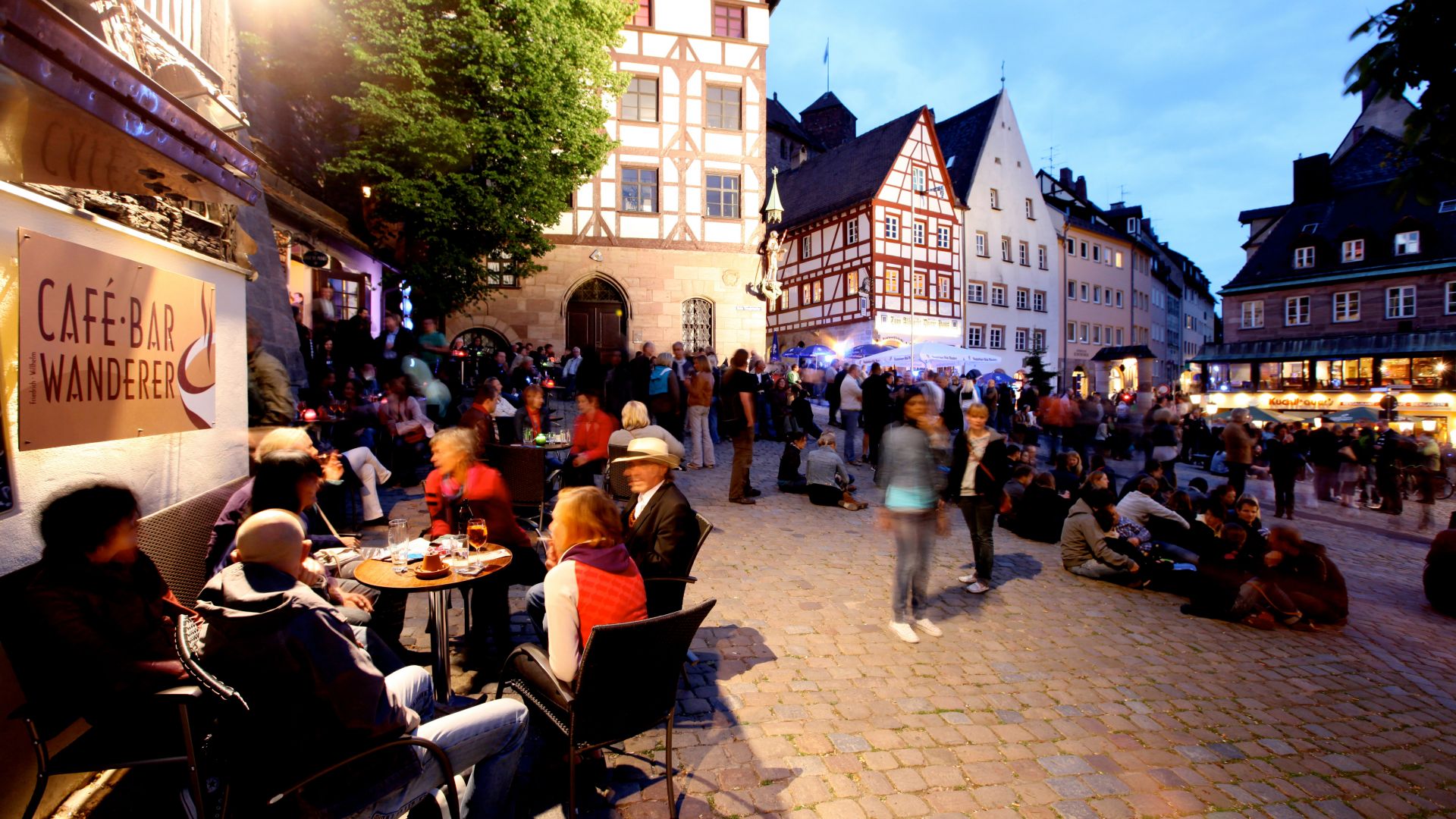 Tiergärtnertorplatz in summer at night
©CTZ Nürnberg (Steffen Oliver Riese)
Tiergärtnertorplatz in summer at night
©CTZ Nürnberg (Steffen Oliver Riese)
Stuttgart Folk Festivals:
Spring Festival, Cannstatter Wasen & Kramermarkt
Celebrate at the Cannstatter Wasen in spring and autumn. This family folk festival has become a popular destination for all generations in both seasons. Like its marquees, colourful rides and stalls, the Krämermarkt has always been part of the Stuttgart Spring Festival and Cannstatter Volksfest: around 30 traders offer textiles, leather and household goods, jewellery, art, tea, spices, cosmetics and gifts on the Wasen towards König-Karls-Brücke. Away from the hustle and bustle of the Volksfest, you can stroll and shop there to your heart's content in a more relaxed environment. Also look out for the "Wasenhasi", the official mascot of the Wasen: he'll be out and about on the square in the afternoon and you can have your picture taken with him – sometimes you can also spot him on the Ferris wheel or roller coaster. Definitely a great experience Wasen visitors of all ages in spring and autumn!
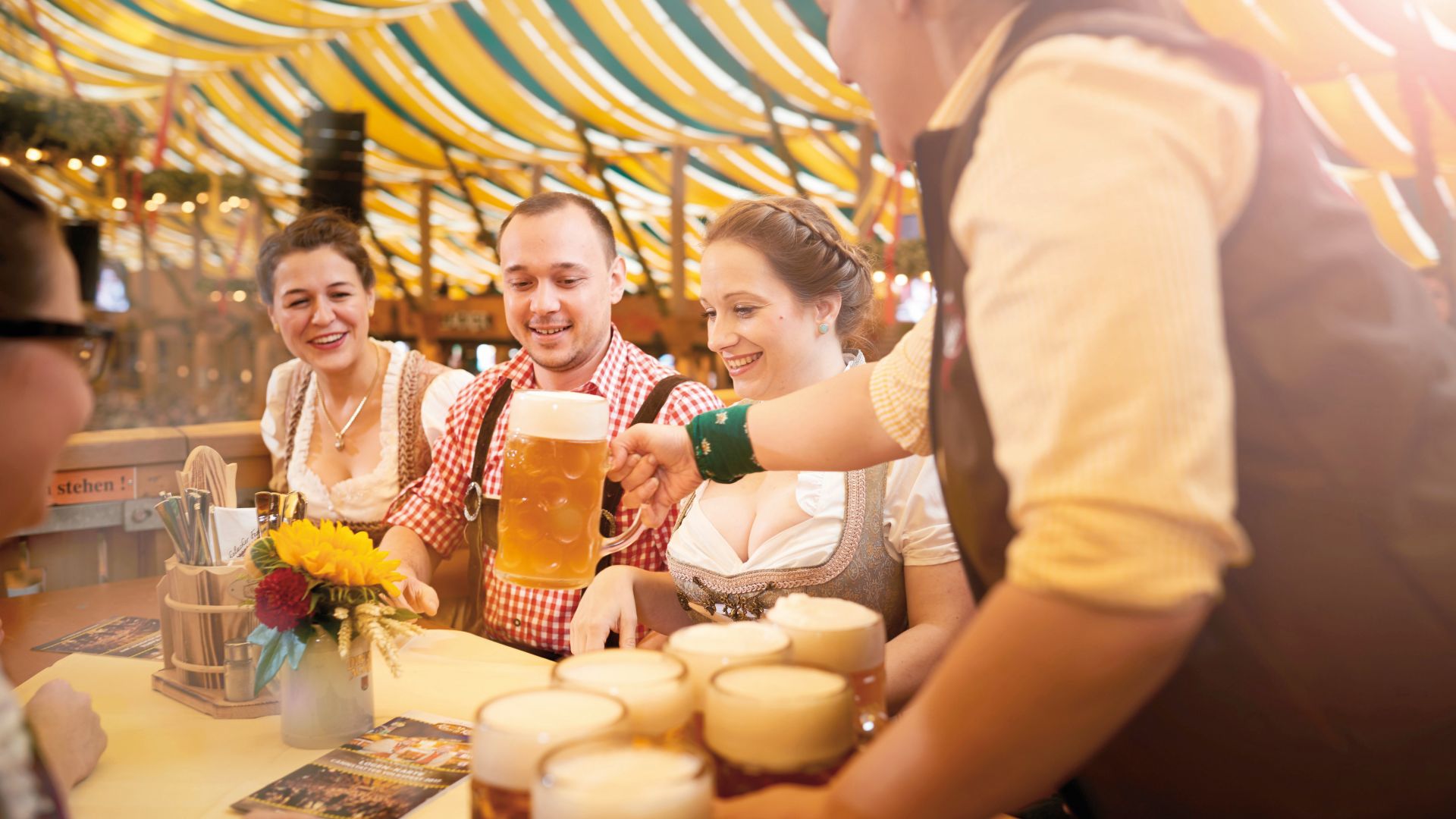 Stuttgart: In the beer tent at the people's fair on the Cannstatter Wasen
©Stuttgart-Marketing GmbH (SMG) (Jean-Claude Winkler)
Stuttgart: In the beer tent at the people's fair on the Cannstatter Wasen
©Stuttgart-Marketing GmbH (SMG) (Jean-Claude Winkler)
Hamburg Port Birthday Festival
They say that on the 7th May, 1189, the Emperor Frederick Barbarossa issued a charter to the people of Hamburg, granting them duty-free access for their ships on the Elbe from the city to the North Sea. Even though there are rumours among historians that the charter was forged, the people of Hamburg are still determined to celebrate the Port City Birthday on 7th May. Lots of sights on water and on land: the opening service in St. Michael's Church, the opening parade, the tugboat ballet, the colourful harbour mile, a sea of lights for the port's birthday and the departure parade – when the ships in the harbour say "Goodbye, see you next year": in Hamburg, anyone who loves water, ships of all kinds and the atmosphere of a folk festival gets their money's worth. This Hanseatic city celebrates its legendary harbour festival around the Hamburg Landungsbrücken along the Elbe River – an unforgettable experience, for sure.
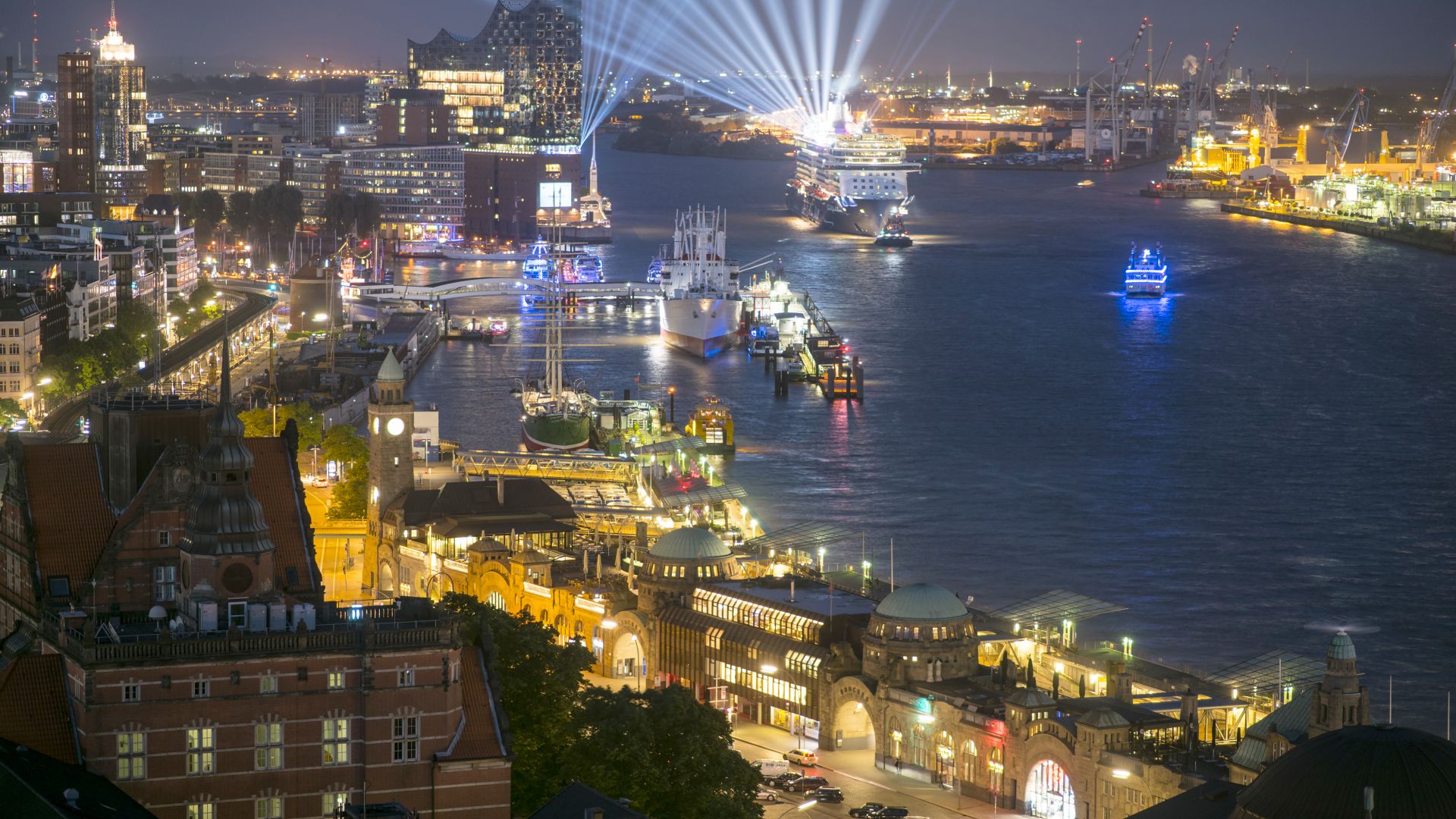 Hamburg: Launching in the Port of Hamburg, Elbphilharmonie
©DZT (Michael Neumann)
Hamburg: Launching in the Port of Hamburg, Elbphilharmonie
©DZT (Michael Neumann)
"KiWo": Kiel Week
The largest international sailing event and folk festival all in one: Kiel Week attracts water sports enthusiasts from all over the world to Kiel, which is transformed into a large festival ground during this time. There are Olympic and non-Olympic regattas and surfing competitions, and everywhere there is something to see and marvel at – especially, of course, magnificent boats, ships and yachts. There's also plenty of sports, live music and dancing, hot air balloons in all shapes and colours, soapbox races, culinary delights and much more. Kiel Week usually starts in the last full week of June and always ends on the last Sunday of June. A folk festival on water and land in the far north of Germany!
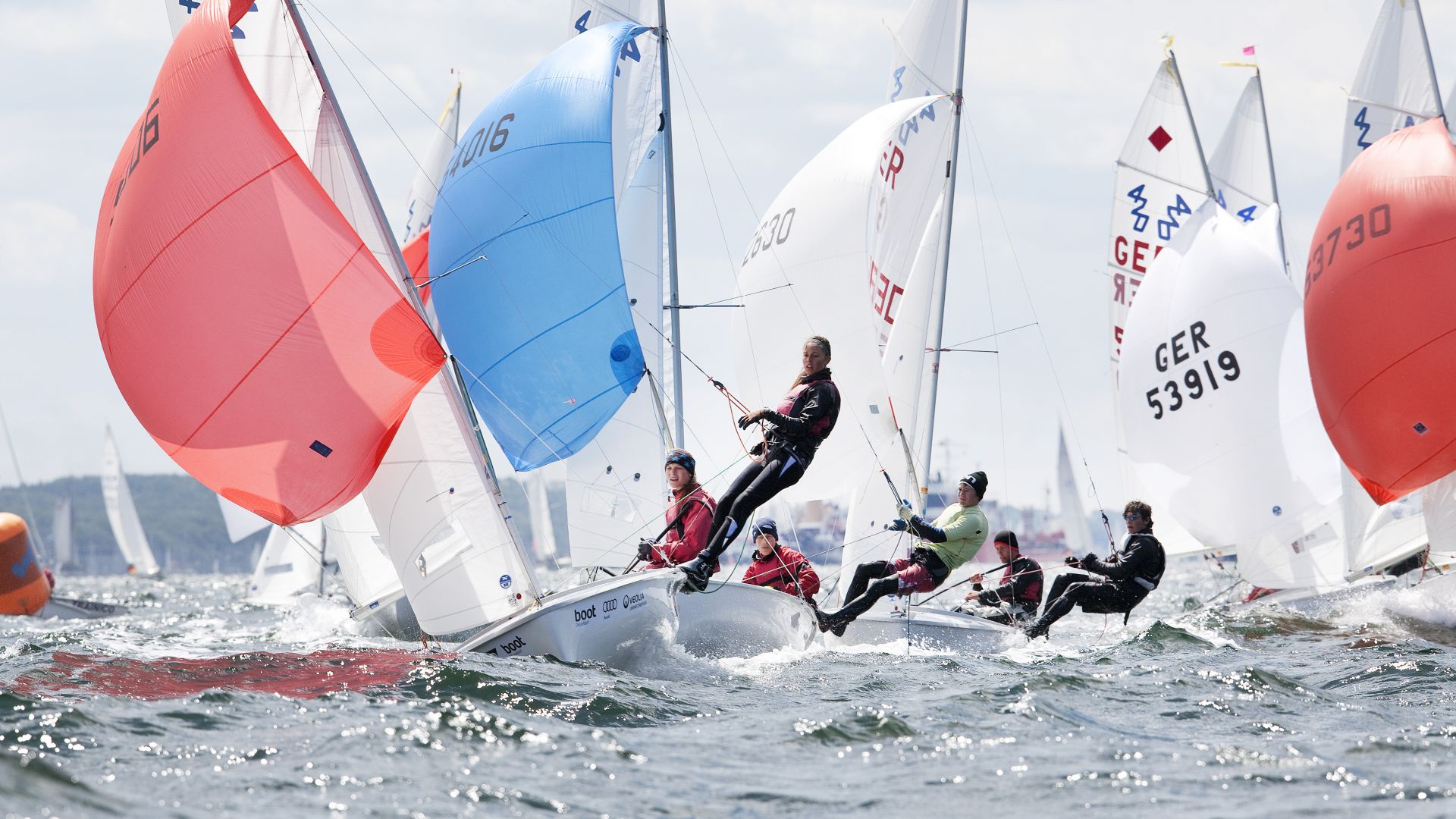 Kiel: Sailing ships at the Kiel Week
©TASH (Heinrich Hecht)
Kiel: Sailing ships at the Kiel Week
©TASH (Heinrich Hecht)
Hanover Schützenfest
The Hanover Schützenfest (shooting festival) takes place on the approximately ten-hectare Schützenplatz. The tradition dates back to the 15th century. The size of the event space, the number of huge attractions, and the number of marquees is impressive: about 200 fairground entertainers delight their guests with innovative high-tech rides, carousels, ghost trains, lottery booths, and many other attractions. Hanover has relatively high number of professional clubs, with 67 shooting clubs and societies, and has held the official honorary title of "German Shooting City" since the 1950s. The Schützenausmarsch, with more than 10,000 participants from Germany and abroad, more than 40 floats and carriages and a length of about ten kilometers, is definitely an impressive experience for all visitors to this city on the Leine.
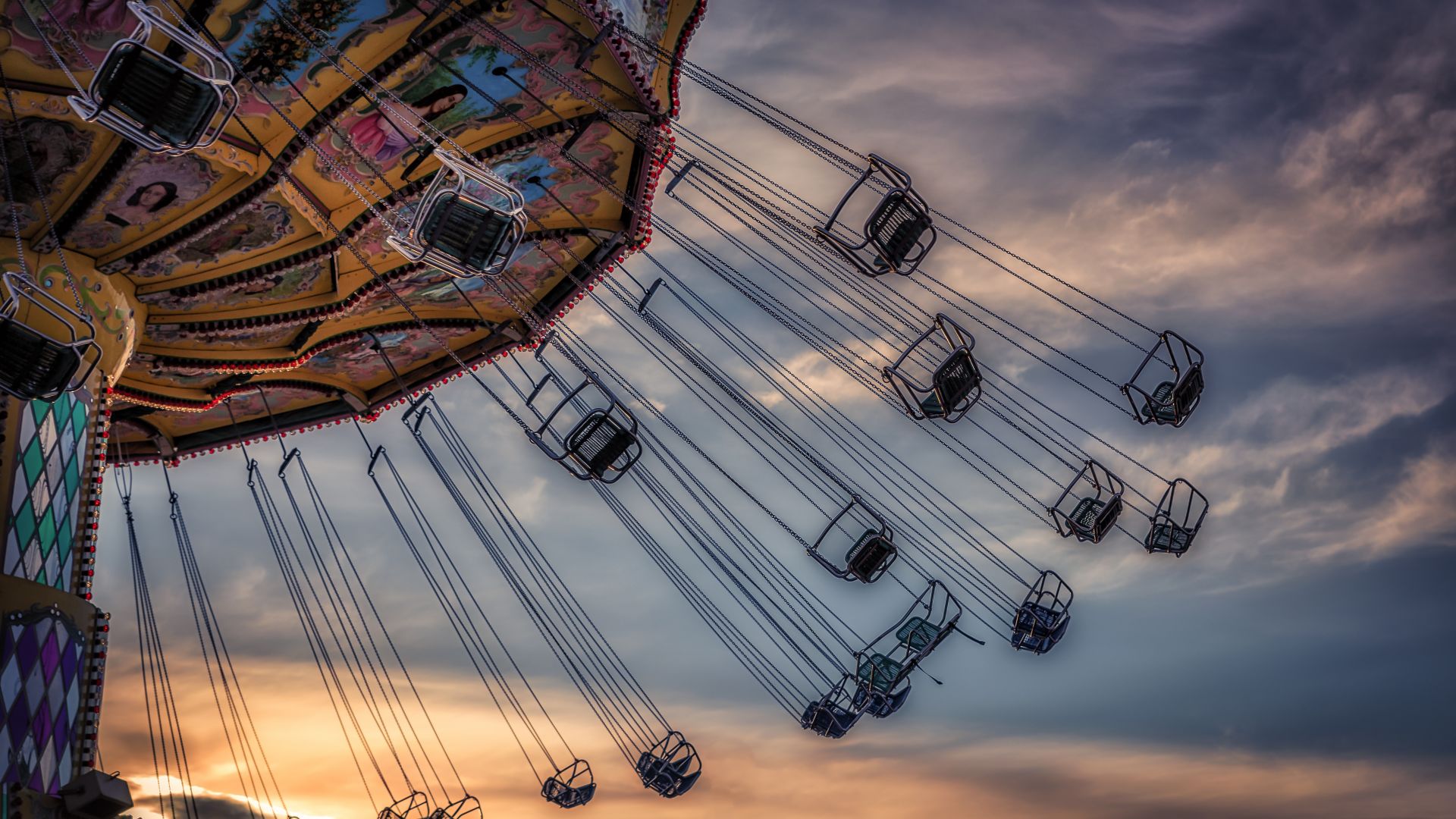 Hanover: Chain carousel at the Schützenfest
©Adobe Stock (Leinemeister)
Hanover: Chain carousel at the Schützenfest
©Adobe Stock (Leinemeister)
Düsseldorf Rheinkirmes
Altbier and roller coasters: every year, the fairground on the left bank of the Rhine in Düsseldorf-Oberkassel hosts the Düsseldorf Kirmes which takes place in the third week of July. Along a front of about 4.5 kilometres and over 165,000 square metres, more than 300 fairground entertainers from Germany and abroad present a colourful selection of rides, booths and merry-go-rounds. Whether fast-paced, child-friendly, breathtaking, enchanting or even nostalgic: every fairgoer will find their personal favourite on the banks of the Rhine. The Rhine Kirmes has every right to be nostalgic, because the fair has a history that dates back centuries: the tradition of bird shooting, a custom at the fair to mark the consecration of the Catholic Basilica of St. Lambertus, has been documented since 1435.
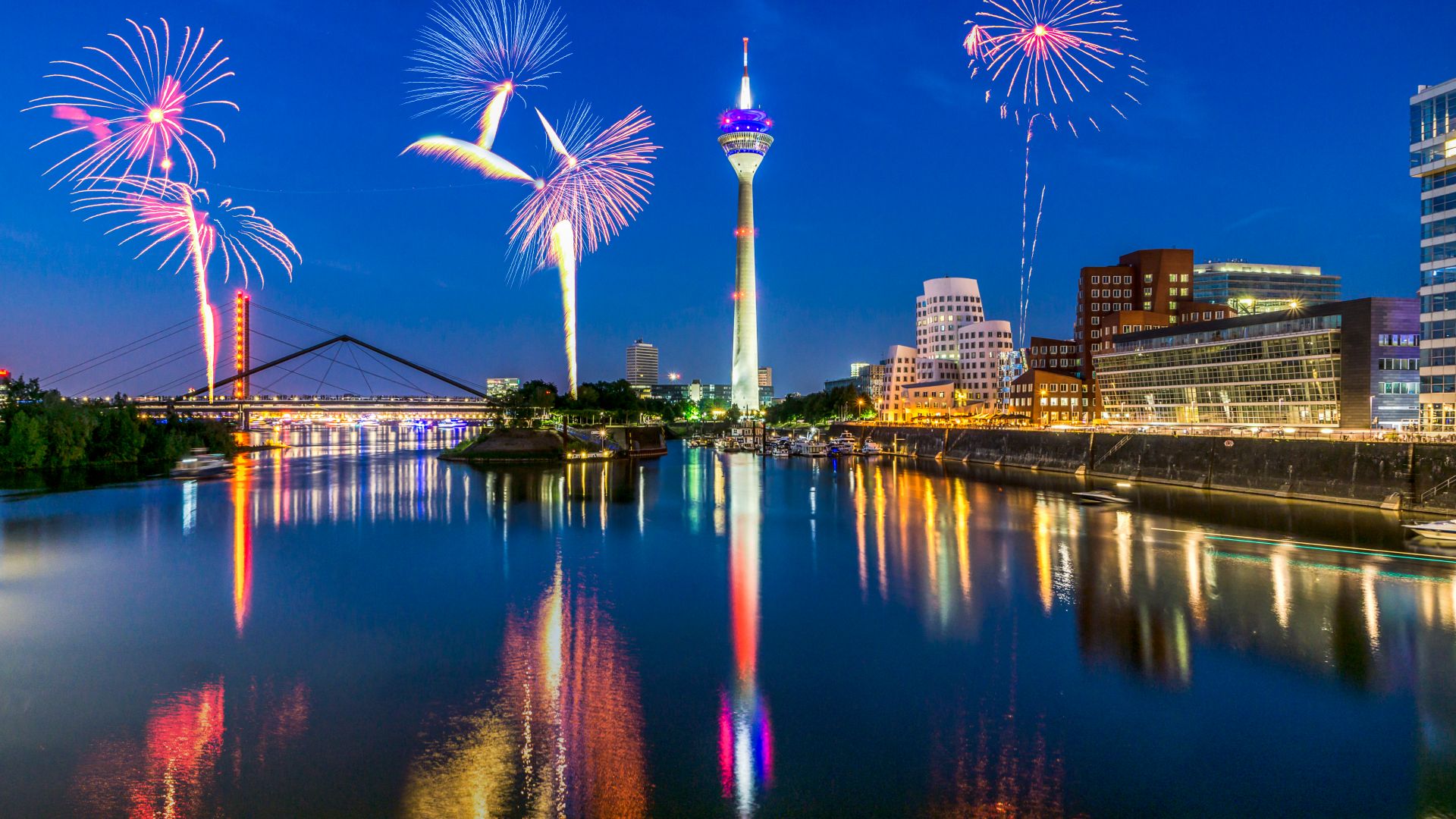 Düsseldorf: Fireworks over the Rhine, in the background the Media Harbour with Rhine Tower and New Customs Yard by Frank O`Gehry
©Getty Images (Daniel Keuck)
Düsseldorf: Fireworks over the Rhine, in the background the Media Harbour with Rhine Tower and New Customs Yard by Frank O`Gehry
©Getty Images (Daniel Keuck)
Cranger Kirmes in Herne
The folk festival usually begins on the first Friday in August and takes place in the district of Crange, from which it gets its name. The fair opens with the Pferdemarkt (horse market) on Friday morning, after the so-called "citizens' evening" has been celebrated the day before. The fair dates back, according to tradition, to the 15th century, when it used to be a horse market attended by jugglers, performers and fairground people. On Friday evening there is traditionally the big opening fireworks and on Saturday there's a parade. Wednesday has established itself as a family day and has discounted prices. The fair ends on Sunday with a closing fireworks display.
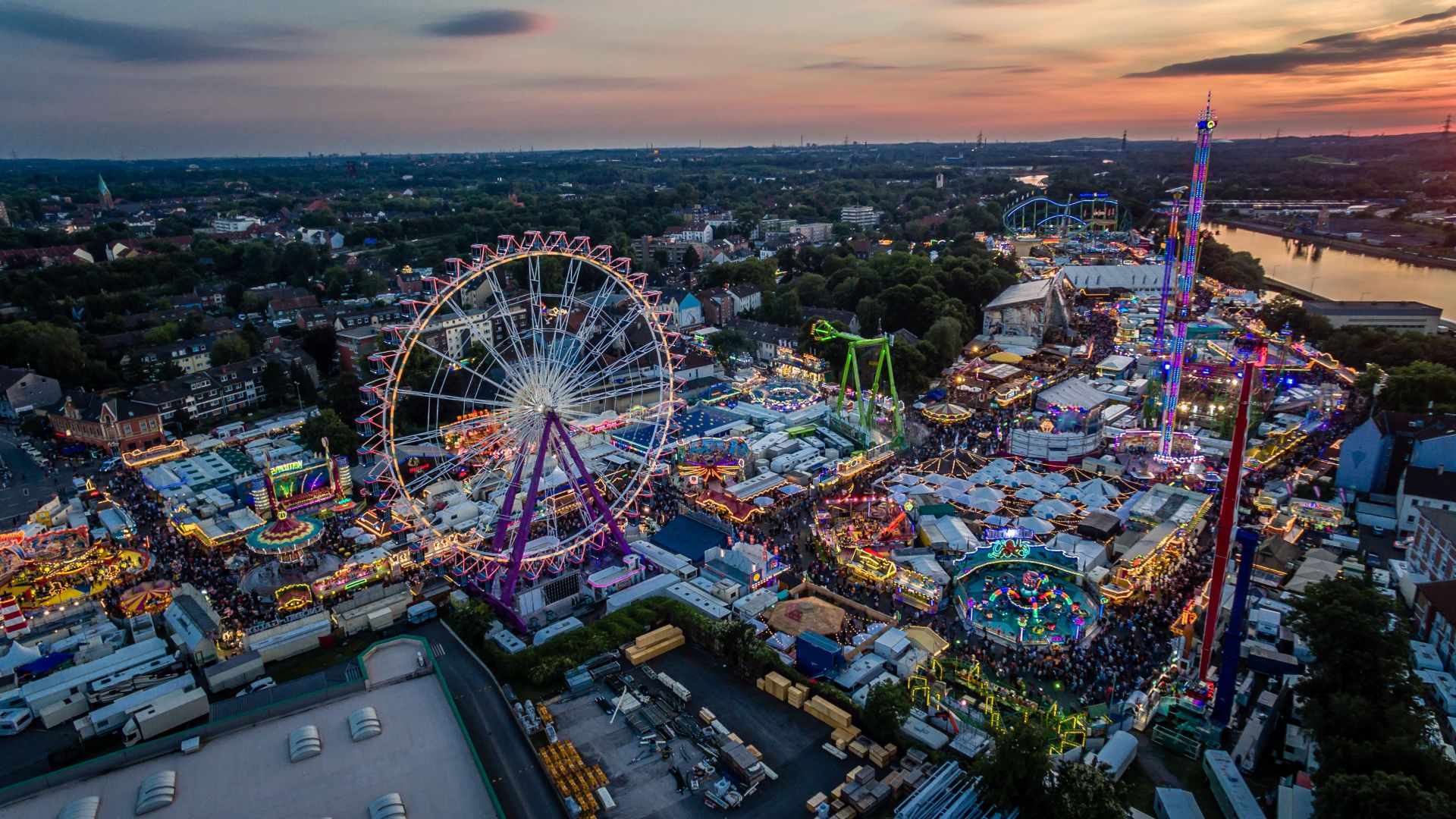 Herne: Cranger Kirmes
©Adobe Stock (luna1904)
Herne: Cranger Kirmes
©Adobe Stock (luna1904)
Munich Oktoberfest
You've probably heard of it: the classic cry of "O'zapft is!" that can be heard after the tapping of the first beer barrel by the incumbent mayor of Munich has spread from the Bavarian capital to all corners of the world. The "Wiesn" began with the wedding of Bavarian Crown Prince Ludwig and Princess Therese of Saxony-Hildburghausen: at the end of their wedding festivities in October 1810, a horse race was held on a meadow outside Munich. In honor of the bride, the festival meadow ("Wiese") was christened "Theresens-Wiese" and so the Oktoberfest site is still called "Theresienwiese" today – "the Wiesn" for short. For 18 days, the city on the Isar completely transforms itself: millions of guests from all over the world descend, large horse-and-carriage parades representing breweries go by and then, of course, the "Wiesn". As always, there's specially-brewed festival beer, special editions of the traditional beer tankards, hundreds of merry-go-rounds and rides, and plenty of lederhosen and dirndls to marvel at.
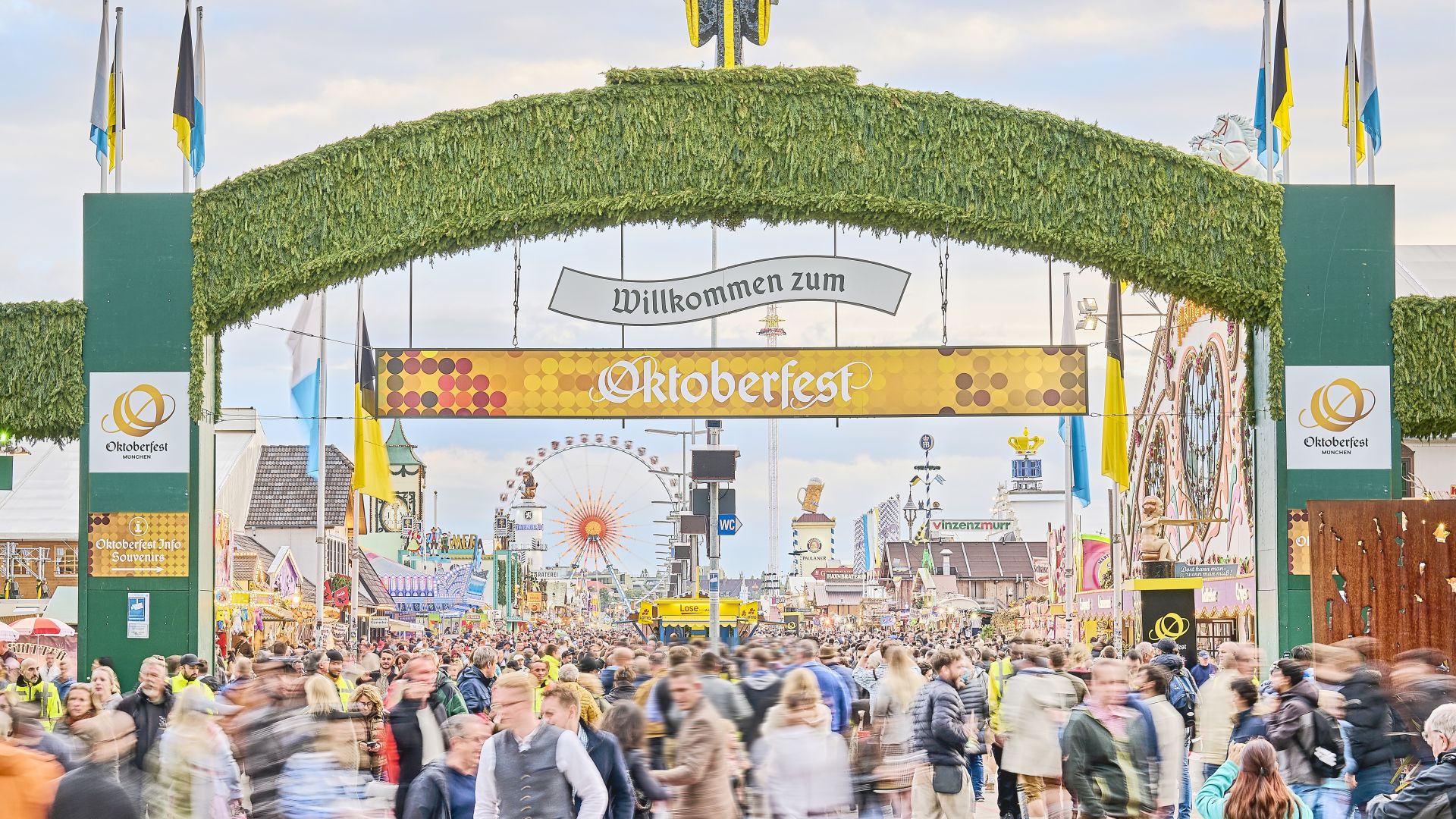 Munich: Entrance of theOktoberfestplatz
©DZT (Jens Wegener)
Munich: Entrance of theOktoberfestplatz
©DZT (Jens Wegener)
Bremen Freimarkt
For almost 1,000 years, Bremen's extra fifth season has been celebrated in the last two weeks of October. For 17 days, this city on the river turns upside down. Around 50 rides provide thrills for big and small, young and old. In this Hanseatic city on the Weser, people really know how to party. Since the year 1035, the city has been celebrating its fair market status (i.e. the carefully-balanced equality of bartering) year after year, thus maintaining one of the longest folk festival traditions in Germany. If you prefer a more peaceful setting, stroll to Bremen's market square. A feast for the senses awaits visitors at the "Kleiner Freimarkt". Steaming deep-fried doughnuts, toasted almonds and spicy liquorice attract visitors to the lovingly-prepared stalls designed in the traditional style.
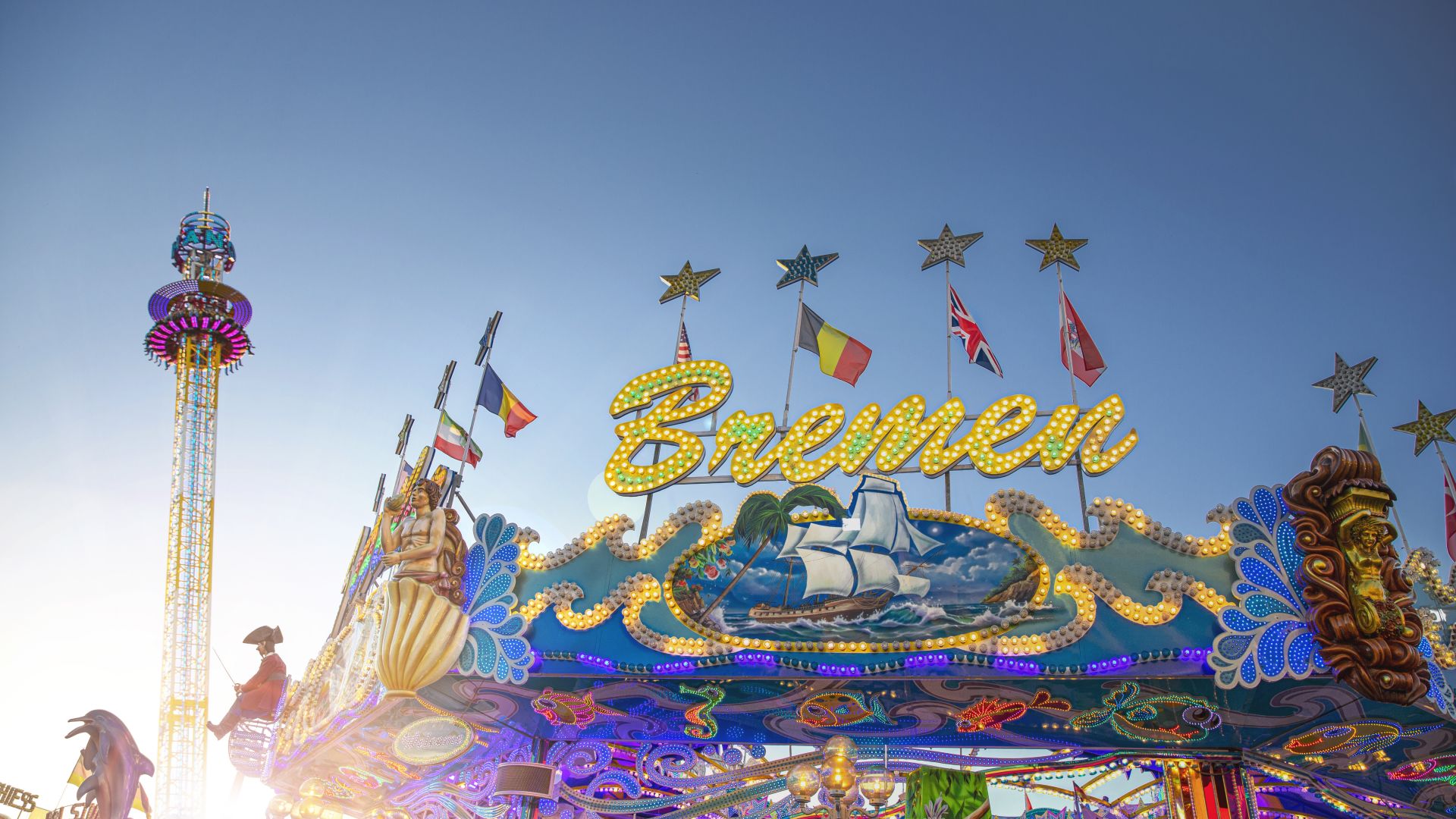 Bremen: Volksfest Freimarkt in the evening
©WFB Bremen (WFB Carina Tank)
Bremen: Volksfest Freimarkt in the evening
©WFB Bremen (WFB Carina Tank)
All Saints' Fair, Soest
Once a year, for five days, something incredible happens in the time-honoured Hanseatic city of Soest: 400 fairground entertainers across 50,000 square metres of space, with high-tech rides against the historic backdrop of Soest's old town. There are carts that are catapulted into the sky. Wheels higher than houses. Church spires illuminated in bright red, yellow and green. Spaceships that land in the middle of the road. Monsters hiding behind the corner of the next house. Bulls' eyes that taste delicious. People just missing half-timbered houses as they fly through the air. Soesters who can't find their bed for five days. In short: the city turns upside down. You have to see it to believe it.